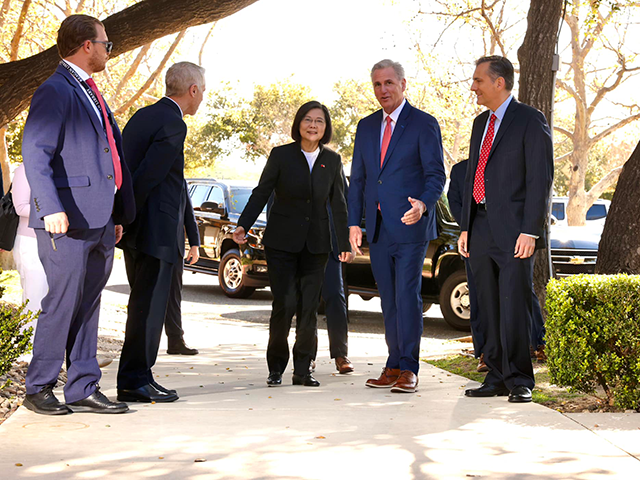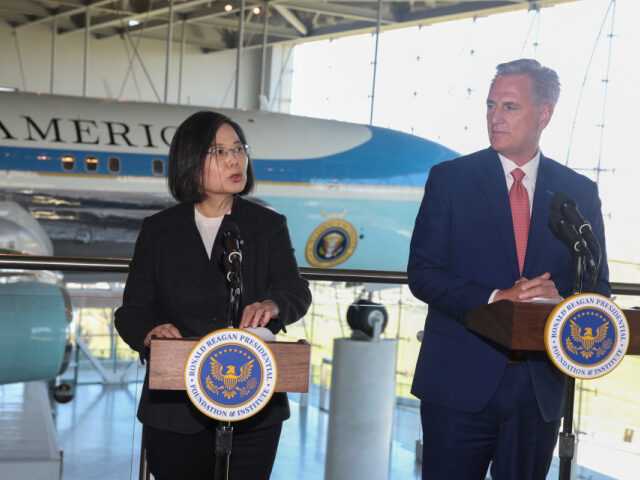China’s state-run Global Times pumped out editorials on Thursday and Friday accusing U.S. House Speaker Kevin McCarthy of using his “sneaky” meeting with Taiwanese President Tsai Ing-wen at the Reagan Library in California on Wednesday to “create the illusion” of influence for a “weak” United States.
The Global Times cited its usual roster of “Chinese experts” in a hyperventilating editorial that claimed McCarthy is using “anti-China rhetoric” and the “Taiwan question” to make himself look more influential than he really is.
The Chinese editorial amusingly accused McCarthy of talking about the creation of a House Select committee on the China threat as a mere “ploy” to get Republicans elected, then grudgingly admitted he delivered on his promise within three days of becoming speaker.
The Global Times comically oversold Taiwan issues as partisan red meat, then desperately rummaged through left-wing American media to find every bad thing ever said about McCarthy, and finally collapsed in a quivering heap after reminding readers for the umpteenth time that the current speaker of the House has the same last name as Sen. Joe McCarthy.
The editorialists then hopped into the Wayback Machine to quote their own old interviews with American officials who mourned the deteriorating U.S.-China relationship and mutter about the unfairness of the Chinese Exclusion Act of 1882, which all seem rather far afield from the original thesis that McCarthy chatting with Tsai for an hour was some kind of nefarious plot to cadge American votes by demonizing Beijing.
The end of the lengthy editorial revealed that what really annoys the tyrants of Beijing is that Taiwan is not a slice of Republican red meat, but rather a bipartisan consensus that China would very much like to disrupt before it takes any strenuous actions against Taiwan:
The rare “mutual support” between the two parties in the US is also frequently reflected in bills related to the Taiwan question. The 2022 annual US National Defense Authorization Act (NDAA) contains content related to Taiwan island. For example, the legislation authorized up to $10 billion in security assistance over the next five years to modernize Taiwan’s security capabilities to deter aggression by Beijing.
Chinese experts said this shows that the two parties in the US are keeping on the same page in taking advantage of the Taiwan question to serve their political purposes.
Even by the standards of hair-on-fire Global Times editorials, this was a lot of opprobrium to heap on a fairly relaxed meet-and-greet in California that ended with McCarthy and Tsai delivering short boilerplate speeches about the friendship between America and Taiwan.

House Speaker Kevin McCarthy and Taiwanese President Tsai Ing-wen in California (Facebook/Speaker Kevin McCarthy)
It was also incongruous with China’s relatively milquetoast response to the meeting after weeks of blustery threats, a dissonance the Global Times tried to resolve in a second editorial that claimed mighty China’s “firm and resolute” measures against the “erroneous move” of the House speaker will be coming any day now:
While the Chinese Defense Ministry has yet to announce concrete countermeasures in its statement, media on the island of Taiwan have been reporting intensive PLA activities near the island since Wednesday.
The defense authority on the island of Taiwan said in a press release on Thursday that it detected three PLA vessels and a PLA Ka-28 anti-submarine warfare helicopter around the island over the past few days.
The Ka-28 is a type of vessel-borne helicopter, and its flight paths illustrated in the press release show it took off from and landed in a sea region to the southwest of the island of Taiwan, so it very likely operated from one of the PLA vessels, analysts said.
The Global Times tried to build up the passage of China’s Shandong aircraft carrier group to the southeast of Taiwan as an ominous demonstration of power, even though it later admitted China’s older aircraft carrier Liaoning has sailed through the same waters before, and its activities were not quite headline news.
The Chinese propagandists concluded by hoping Tsai would be “tracked, monitored, or even escorted by PLA warplanes” on her flight home to Taiwan. Tsai hopped off her plane in Taipei on Friday to give a chipper speech about how much she enjoyed her time in America, so if the PLA tried to harass her flight, it did not seem to bother her much.
In fact, Reuters reported on Friday that Taiwan’s Defense Ministry denied a Taiwanese media report that Tsai’s inbound flight was subjected to “unknown interference.”
The Defense Ministry said it dispatched a naval and air “task force” to “control the whole process” of Tsai’s return flight.

COMMENTS
Please let us know if you're having issues with commenting.